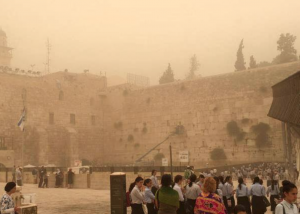
With no immediate relief in sight, hundreds of people throughout Israel have already been treated for respiratory problems, with some children & adults hospitalized.
• Flights to Eilat currently grounded.
By Israel Hayom Staff
Meteorological reports on Tuesday confirmed what Israelis, who have not seen the sun or been able to breathe without coughing since Monday, already knew: The country is in the grips of a sandstorm of unprecedented scale.

The view of Haifa in northern Israel is nearly obliterated by sand – Photo: Michel Dot Com
Major sandstorms are typical in the spring, but on Tuesday Israel and its neighboring nations woke up to the heaviest September sandstorm in 15 years. In fact, according to the Israel Meteorological Service, such high levels of sand have not been noted in the 75 years that the weather has been officially recorded.
Naturally, air pollution levels soared. Jerusalem had the dubious honor of registering the worst air quality in the nation, with pollution levels 173 times higher than average. Afula in northern Israel had air 60 times more polluted than average, while Eilat saw levels that were 33 times higher.

A satellite image of the storm, which began in Syria – Photo: AFP
The thick sand, which began as a storm in Syria, came hand in hand with oppressive temperatures. A heat wave hovered over the hillier regions and central Israel, and the coast was hot and steamy, with humidity of over 85%.
The weather conditions caused hundreds of cases of respiratory difficulty. Magen David Adom paramedics treated 255 people who had trouble breathing, while the emergency room at Rebecca Sieff Hospital in Safed treated more than 30 patients for respiratory trouble, two of whom had to be hospitalized in serious conditions.

Tel Aviv was dealt a double whammy: Sand haze and oppressive humidity of over 85% – Photo: Yehoshua Yosef
One hospitalized sufferer was Yaakov Wald, 80, from Kibbutz Shamir in the upper Galilee.
“I went to sleep with the windows open. At 4 a.m. I woke up short of breath and I called my daughter to come and help me,” Wald said.
The emergency room at Kaplan Medical Center in Rehovot also reported an increased number of respiratory cases, treating 20% more patients than usual for breathing difficulties.
“We’re seeing serious cases that require kids to be hospitalized, or even pediatric intensive care,” said Dr. Uri Bela, the director of the hospital’s pediatric emergency room.

The abomination on the Temple Mount has disappeared behind the sandstorm in Jerusalem. – Photo source: Facebook
The weather also disrupted flight schedules. Early morning domestic flights to Eilat were delayed as aircraft taking off from the Ben-Gurion and Sde Dov airports were forced to turn back. Later in the day, Israeli airlines announced that all morning flights had been canceled because of the dust, and that a decision would be taken Wednesday based on the weather conditions about whether to re-start the Eilat flights. Israir announced that for its passengers’ convenience, it would provide bus services to and from Eilat.
No immediate relief is in sight. According to Meteo-Tech forecaster Nahum Malik, the heat wave is expected to lessen only slightly on Thursday, with an additional drop in temperatures expected on Saturday and on Sunday, when the country will celebrate Rosh Hashanah.
View original Israel Hayom publication at:
http://www.israelhayom.com/site/newsletter_article.php?id=28167






 Israeli New Shekel Exchange Rate
Israeli New Shekel Exchange Rate